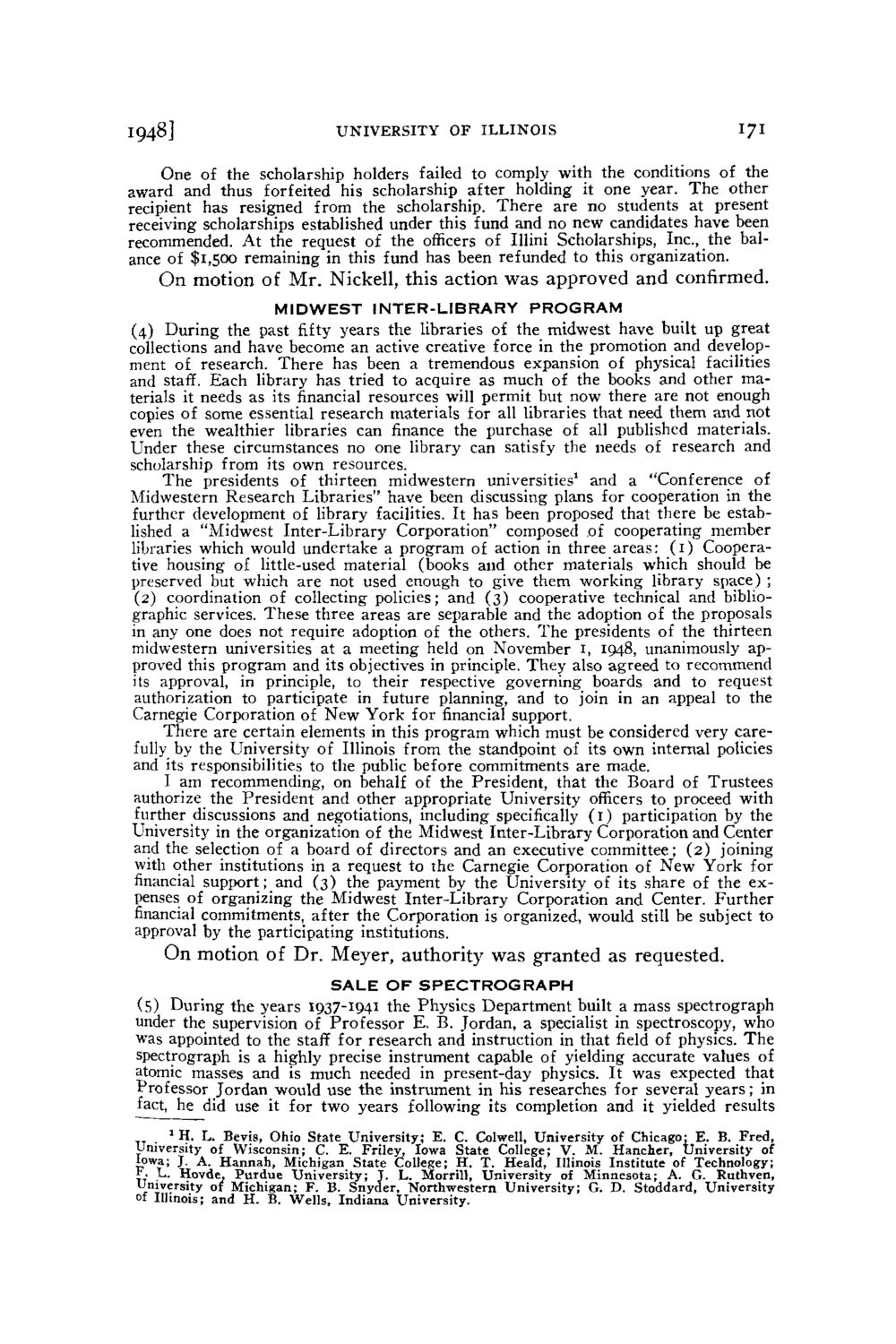| |
| |
Caption: Board of Trustees Minutes - 1950
This is a reduced-resolution page image for fast online browsing.

EXTRACTED TEXT FROM PAGE:
1948] U N I V E R S I T Y OF I L L I N O I S 171 One of the scholarship holders failed to comply with the conditions of the award and thus forfeited his scholarship after holding it one year. The other recipient has resigned from the scholarship. There are no students at present receiving scholarships established under this fund and no new candidates have been recommended. At the request of the officers of Mini Scholarships, Inc., the balance of $1,500 remaining in this fund has been refunded to this organization. On motion of Mr. Nickell, this action was approved and confirmed. MIDWEST INTER-LIBRARY PROGRAM (4) During the past fifty years the libraries of the midwest have built up great collections and have become an active creative force in the promotion and development of research. There has been a tremendous expansion of physical facilities and staff. Each library has tried to acquire as much of the books and other materials it needs as its financial resources will permit but now there are not enough copies of some essential research materials for all libraries that need them and not even the wealthier libraries can finance the purchase of all published materials. Under these circumstances no one library can satisfy the needs of research and scholarship from its own resources. The presidents of thirteen midwestern universities 1 and a "Conference of Midwestern Research Libraries" have been discussing plans for cooperation in the further development of library facilities. It has been proposed that there be established a "Midwest Inter-Library Corporation" composed of cooperating member libraries which would undertake a program of action in three areas: (1) Cooperative housing of little-used material (books and other materials which should be preserved but which are not used enough to give them working library space) ; (2) coordination of collecting policies; and (3) cooperative technical and bibliographic services. These three areas are separable and the adoption of the proposals in any one does not require adoption of the others. The presidents of the thirteen midwestern universities at a meeting held on November I, 1048, unanimously approved this program and its objectives in principle. They also agreed to recommend its approval, in principle, to their respective governing boards and to request authorization to participate in future planning, and to join in an appeal to the Carnegie Corporation of New York for financial support. There are certain elements in this program which must be considered very carefully by the University of Illinois from the standpoint of its own internal policies and its responsibilities to the public before commitments are made. I am recommending, on behalf of the President, that the Board of Trustees authorize the President and other appropriate University officers to proceed with further discussions and negotiations, including specifically (1) participation by the University in the organization of the Midwest Inter-Library Corporation and Center and the selection of a board of directors and an executive committee; (2) joining with other institutions in a request to the Carnegie Corporation of New York for financial support; and (3) the payment by the University of its share of the expenses of organizing the Midwest Inter-Library Corporation and Center. Further financial commitments, after the Corporation is organized, would still be subject to approval by the participating institutions. On motion of Dr. Meyer, authority was granted as requested. SALE OF SPECTROGRAPH (5) During the years 1937-1941 the Physics Department built a mass spectrograph under the supervision of Professor E. B. Jordan, a specialist in spectroscopy, who was appointed to the staff for research and instruction in that field of physics. The spectrograph is a highly precise instrument capable of yielding accurate values of atomic masses and is much needed in present-day physics. It was expected that Professor Jordan would use the instrument in his researches for several years; in fact, he did use it for two years following its completion and it yielded results ' H . L. Be™, Ohio State University; E. C. Colwell, University of Chicago: E. B. Fred, University of Wisconsin; C. E. Friley, Iowa State College; V. M. Handier, University of iowa; J. A. Hannah, Michigan State College; H. T. Heald, Illinois Institute of Technology; *v L. Hovde, Purdue University; T. L. Morrill, University of Minnesota; A. G. Ruthven, university of Michigan; F. B. Snyder, Northwestern University; G. D. Stoddard, University of Illinois; and H. B. Wells, Indiana University.
| |